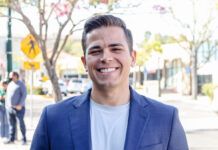Student journalists at the Southwestern College Sun newspaper make it a priority to attend the Associated Collegiate Press national convention each year to network, meet professional journalists from prestigious newspapers like The Washington Post and participate in workshops.
But this October, eight Sun reporters are barred from attending the five-day event since it’s in Dallas a city in one of eight states that the California Legislature has banned travel to effective Jan.1, 2017.
Through Assembly Bill 1887 California first issued a ban on state-funded and state sponsored travel to Kansas, Mississippi, North Carolina, and Tennessee for imposing laws that California says discriminate against the LGBT community.
But in June the travel ban doubled with the additions of Alabama, Kentucky, South Dakota and Texas.
The assembly bill reads that “California must take action to avoid supporting or financing discrimination against lesbian, gay, bisexual and transgender people.”
The travel ban list also includes states California believes don’t protect religious freedoms and states that it says use religious freedom as a basis of discrimination. The ban applies to state agencies, departments, boards, authorities, and commissions, including an agency, department, board , authority or commission of the University of California, and the California State University.
Assemblywomen Lorena Gonzalez Fletcher and Shirley Weber, the local assembly members in the South Bay, both voted on the assembly floor in favor of the ban.
Last semester SWC Sun students attended a smaller convention in San Francisco. Now that the event is in Dallas, Sun reporters will be staying home.
“When I found out we couldn’t go I was crushed,” said Sun News Editor Katy Stegall, who said she was not aware of the ban until she was notified about it three weeks ago. “It sucks. We are not happy. I understand why the travel ban was placed but it sucks.”
Stegall,23, said upon hearing she would not be attending this year’s event, her and SWC journalism professor and newspaper advisor Max Branscomb attempted to think of ways to get around the ban from writing a letter to ACP officials, petitioning local legislatures and joining other California schools in organizing. But in the end, Stegall said there was no way around the ban.
The travel ban cuts off funding to state funded programs but that does not mean Stegall cannot attend the convention on her own. Although it is unlikely that she will since she does not have the financial means to go, so she said, she relies on the state to fund it.
“As a lower-income student this isn’t something I would be able to do in my normal life,” she said.
Branscomb said it cost about $10,00 to $12,000 in state funded money to take eight students on the trip. The state gives the college state funded money which in turns the college distributes that money to different programs.
Branscomb said although the ban affects his students, he fully supports it, especially, he said since many of his Sun students are part of the LGBT community.
“I’m very sad that we’re not going (to Dallas),” he said. “I think our students are disappointed but philosophically I support the ban. I do not think American states should not have laws that are cruel to LGBT people and discriminate against LGBT people.
“It kind of hurts (to be banned from going to Dallas) and we’re all bummed but we all understand the bigger cause that’s at stake and we support that.”
Stegall said she does not see the ban being lifted any time soon and it could affect students from attending other events in the future.
“As long as these other states continue to have anti-LGBT laws we are going to have this issue of (not being allowed to travel to banned states).
The 2018 ACP national convention is scheduled to be held in Kentucky, another banned state. Branscomb said it is possible that his students might not see the event for the next two years.
“We may not go next year unless Kentucky changes its laws,” Branscomb said.












